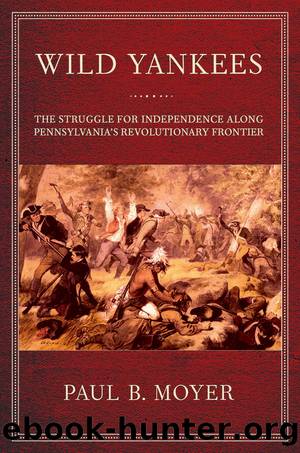Wild Yankees by Paul B. Moyer

Author:Paul B. Moyer [Moyer, Paul B.]
Language: eng
Format: epub
Tags: History, United States, State & Local, Middle Atlantic (DC; DE; MD; NJ; NY; PA), Revolutionary Period (1775-1800), Colonial Period (1600-1775), Americas (North; Central; South; West Indies)
ISBN: 9781501700828
Google: U1pcCgAAQBAJ
Publisher: Cornell University Press
Published: 2015-10-29T01:10:52+00:00
âYankee-playâ
The arrival of large numbers of New Englanders in Northeast Pennsylvania caused a considerable amount of apprehension among state land claimants. Samuel Preston, a Quaker and land agent for fellow Quaker Henry Drinker, witnessed the growth of Yankee settlements along the upper reaches of the Delaware River. Writing from his home in Harmony, Pennsylvania, Preston informed Drinker that his lands were being occupied by settlers but warned that âtoo many of the emigrants are from the eastward, and more disposed to purloining of timber than of cultivating of farms.â He claimed that New Englanders were âuniversally given to thievingâ and âabundantly more impudent and debauched than any other clan.â Prestonâs prejudice against Yankees ran so deep that he wished they would simply stop comingâin this respect, as in most others, the New Englanders disappointed him.59
Arthur Erwin was another Pennsylvania claimant who felt threatened by the flood of Yankee immigrants. In the spring of 1791, he wrote to Governor Mifflin begging protection from Wild Yankees. Erwin explained that he had purchased five thousand acres along the Tioga River from the state in 1785 and, since that time, had âpatented, settled, cleared, and improvedâ his property. A lone Pennsylvania claimant in a sea of New Englanders, he found himself a target of âInsult and abuseâ by neighbors who disputed his soil rights. On one occasion, Wild Yankees attacked Erwin and broke one of his arms with the handle of a pitchfork. He took his assailants to court and, though âevery necessary proofâ was made of their guilt, they went unpunished. Erwinâs adversaries consolidated their victory in court by stealing his crops and abusing his farmhands.60 Outnumbered and without effective support, Erwin became another victim of agrarian violence. One evening, while on a visit to his tenant Daniel McDuffee, Erwin was shot and killed by an unknown gunman. Joel Thomas, a resident of Athens, was brought to trial for the murder but escaped punishment after being acquitted by a Luzerne County jury.61
As Erwinâs ordeal attests, Wild Yankees were able to take the offensive against Pennsylvania and its land claimants in the last decade of the eighteenth century. They were also to do so because they effectively linked agrarian insurgency to the demographic forces of frontier expansion. The migration of Connecticut claimants into Pennsylvania made it possible for Wild Yankees to muster more settlers than Pennsylvania and its landholders could contend with. William Judd had this situation in mind when he happily observed that New Englanders were âflockingâ to the Northeast frontier âand daily strengthening the Claim.â Judge Jacob Rush, the president of Pennsylvaniaâs Fifth Court of Common Pleas, echoed Juddâs words when he warned Governor Mifflin of the difficulties the state would bring on itself if it allowed large numbers of Yankee settlers to gain a foothold. He concluded that every âEncrease of Inhabitantsâ under the Connecticut claim equalled âan Accession to their Strength.â62
Besides restive Yankee settlers, Pennsylvania had to contend with parties of Yankee surveyors who spread across northeastern Pennsylvania to lay out new towns and fresh lines of resistance.
Download
This site does not store any files on its server. We only index and link to content provided by other sites. Please contact the content providers to delete copyright contents if any and email us, we'll remove relevant links or contents immediately.
| African Americans | Civil War |
| Colonial Period | Immigrants |
| Revolution & Founding | State & Local |
Cat's cradle by Kurt Vonnegut(13906)
Pimp by Iceberg Slim(12954)
Underground: A Human History of the Worlds Beneath Our Feet by Will Hunt(11275)
4 3 2 1: A Novel by Paul Auster(11080)
The Radium Girls by Kate Moore(10929)
American History Stories, Volume III (Yesterday's Classics) by Pratt Mara L(4830)
Perfect Rhythm by Jae(4632)
Wiseguy by Nicholas Pileggi(4610)
The Fire Next Time by James Baldwin(4357)
Paper Towns by Green John(4180)
A Higher Loyalty: Truth, Lies, and Leadership by James Comey(4045)
Pale Blue Dot by Carl Sagan(4024)
The Mayflower and the Pilgrims' New World by Nathaniel Philbrick(3922)
The Doomsday Machine by Daniel Ellsberg(3743)
Too Much and Not the Mood by Durga Chew-Bose(3703)
Killers of the Flower Moon: The Osage Murders and the Birth of the FBI by David Grann(3630)
The Borden Murders by Sarah Miller(3597)
The Sympathizer by Viet Thanh Nguyen(3530)
Killing England by Bill O'Reilly(3469)
